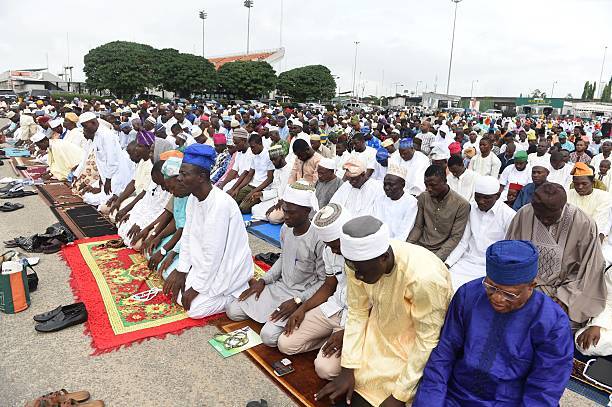
Muslim faithfuls pray to mark the Eid al-Adha (Eid el-Kabir) in Lagos, on Monday 12, 2016. The Eid al-Adha is the second of two Muslim holidays celebrated worldwide each year, and considered the holier of the two. It honors the willingness of Ibrahim (Abraham) to sacrifice his son, as an act of submission to God's command. / AFP / PIUS UTOMI EKPEI (Photo credit should read PIUS UTOMI EKPEI/AFP via Getty Images)
In a global celebration, Muslims around the world are observing Eid al-Adha, also known as Eid il-Kabir, as they commemorate the Feast of Sacrifice. This annual event holds great historical and religious significance, rooted in the story of Prophet Ibrahim (Abraham) and his willingness to obey the command of Allah (God).
According to Islamic tradition, Prophet Ibrahim received a divine vision in which Allah commanded him to sacrifice his son, Ishmail (Isaac). Demonstrating unwavering faith, Prophet Ibrahim prepared to carry out the sacrifice, but at the last moment, Allah intervened. The Angel Gabriel appeared before him with a ram, indicating that the vision had been fulfilled. Prophet Ibrahim then sacrificed the ram as a substitute for his son, Ishmail.
Muslims observe Eid al-Adha to honor the remarkable faith and submission displayed by Prophet Ibrahim and the acceptance of Ishmail. The occasion serves as a reminder of the importance of obedience, perseverance, and complete surrender to the command of Allah.
Significantly, Eid al-Adha aligns with the culmination of Hajj, the annual pilgrimage to the holy cities of Makkah and Madinah in Saudi Arabia, which represents the fifth pillar of Islam. While Hajj is an obligation for those physically and financially capable, the celebration of Eid al-Adha is open to all Muslims worldwide.
The festivities begin with congregational prayers offered to Allah in open spaces, marking a fresh start to the day. These prayers serve as an opportunity for Muslims to express gratitude for Allah’s blessings and grace.
Following the prayers, the sacrifice of an animal is a central aspect of Eid al-Adha. It should be noted that Islam does not impose this responsibility on individuals who are unable to afford it. In the spirit of Prophet Muhammad’s teachings, where he personally slaughtered two rams—one for himself and his family and the other for his followers through generations—the act emphasizes the willingness to give up cherished possessions for the sake of Allah.

The meat from the sacrificed animals holds significance beyond personal consumption. It is divided into three portions: one-third is consumed by immediate family and relatives, one-third is shared with friends, and one-third is donated to those in need. This distribution exemplifies the spirit of generosity and reinforces the importance of strengthening bonds with others while providing assistance to the less fortunate.
Through the act of sacrifice, Muslims also symbolize their commitment to upholding the sanctity of human life and respecting the innocent. It serves as a reminder to societies and governments worldwide to prioritize the protection of human life and ensure safety from criminal activities, including agitations, banditry, and terrorism.
As Muslims worldwide celebrate Eid al-Adha, it is crucial for all individuals to embrace the values of compassion, unity, and respect for human dignity. By fostering an environment of tolerance, cooperation, and upholding the fear of God, nations can strive for true unity and prosperity. Governments at all levels are urged to fulfill their primary responsibility of safeguarding lives and preventing any loss to criminal elements.
Eid al-Adha serves as a reminder to people of all backgrounds to cherish and protect the sanctity of life, thereby fostering a harmonious society and a united nation




